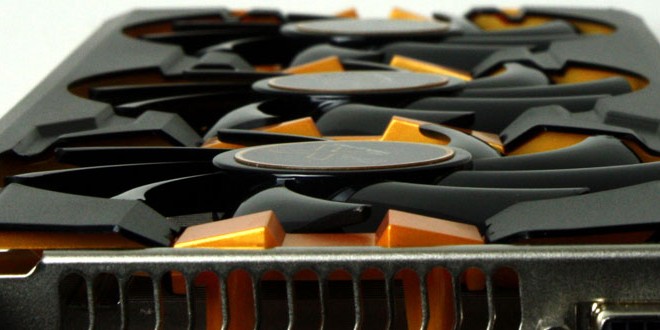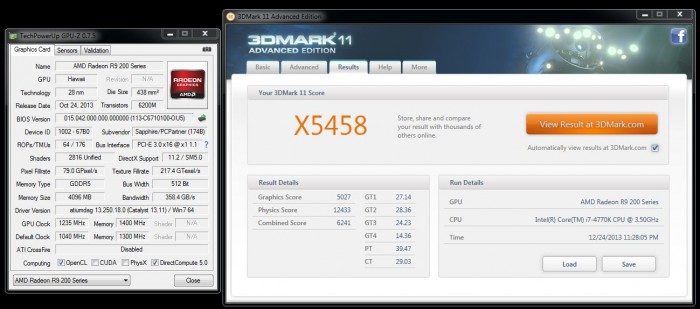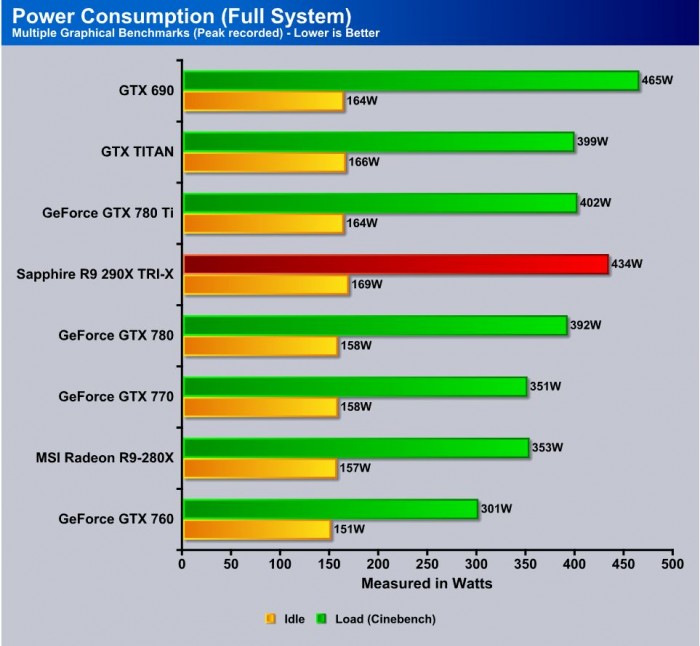Overclocking

Overclocking on AMD was fairly straightforward previously but now that so much has been included into the throttling algorithm it has become a bit of a pain to overclock as well.
Your biggest enemy for overclocking the 290X would be heat when we were testing the reference card which meant that it throttled at stock settings and overclocking just meant it throttled faster.
The Tri-X with its ability to maintain substantially lower temperatures saw much better overclocking capabilities as at stock speeds 3D11 Xtreme mode barely hit a peak of 65C which means there should be plenty of headroom to play with.
Testing with the newest version of the Trixx software from Sapphire I was able to push the gpu a little bit but in order to really see what the card could do we had to start feeding some voltage. without any voltage added the GPU stopped scaling at 1110MHZ but once we started slowly creeping up the volts we found that the GPU stopped at right at 1235MHz with full stability which is a pretty massive overclock at almost 200MHz on the core.
The memory I had hope for since it came stock clocked at 5200 but unfortunately those hopes were quickly dashed as the maximum stable I could get from the memory was 5600MHz before stability was a concern. This tells me that maybe while it offers a massive memory bus the sheer larger Qty of memory ICs is a limiting factor as the higher density will simply not scale as high. but overall with the GPU and memory clock we saw an increase in 3D11 Xtreme mode of over 700 Pts which is nothing to sneer at.
TEMPERATURES

To measure the temperature of the video card, we used MSI Afterburner and ran Heaven Benchmark in a loop to find the Load temperatures for the video cards. The highest temperature was recorded. After looping for 10 minutes, Heaven was turned off and we let the computer sit at the desktop for another 10 minutes before we measured the idle temperatures.
| GPU Temperatures | Temperature (Idle/Load) |
| Nvidia GTX 690 | 32C/81C |
| Nvidia GTX TITAN | 31C/67C |
| Nvidia GTX 780 | 30C/65C |
| Nvidia GTX 770 | 34C/79C |
| Nvidia GTX 760 | 31C/67C |
| Sapphire R9-290X Tri-X | 35C/65C |
The new AMD GPU pumps some serious heat as evidenced by the reference card we tested before but i am happy to report that the new Tri-X cooler keeps the GPU well in check with headroom to push further. Add to this that even under overclock with extra voltage the GPU barely broke into 74C under long term heaven benchmark loading for over 1hr.
POWER CONSUMPTION

To get our power consumption numbers, we plugged in our Kill A Watt power measurement device and took the Idle reading at the desktop during our temperature readings. We left it at the desktop for about 15 minutes and took the idle reading. Then we ran Heaven Benchmark for a few minutes minutes and recorded the highest power usage.
The 290X still pulls a lot of power it’s simply something you must deal with on AMD cards as under load they can definitely pull from the wall with some of the best or even a bit more so its something to be aware of and I hope in the respin on the next series they can figure out some ways to save a bit more power to put them more inline with Nvidia offerings.
Review Overview
Performance - 9.2
Value - 8
Quality - 9.5
Features - 9
Innovation - 9.2
9
Sapphire set out to fix a major issue and they not only fixed it but made it a better card by exceeding expectations!
 Bjorn3D.com Bjorn3d.com – Satisfying Your Daily Tech Cravings Since 1996
Bjorn3D.com Bjorn3d.com – Satisfying Your Daily Tech Cravings Since 1996











